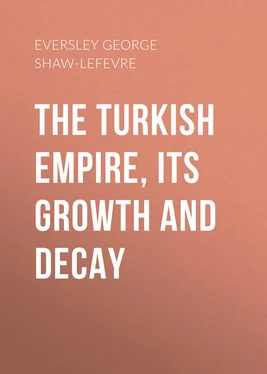George Eversley - The Turkish Empire, its Growth and Decay
Здесь есть возможность читать онлайн «George Eversley - The Turkish Empire, its Growth and Decay» — ознакомительный отрывок электронной книги совершенно бесплатно, а после прочтения отрывка купить полную версию. В некоторых случаях можно слушать аудио, скачать через торрент в формате fb2 и присутствует краткое содержание. Жанр: foreign_antique, foreign_prose, на английском языке. Описание произведения, (предисловие) а так же отзывы посетителей доступны на портале библиотеки ЛибКат.
- Название:The Turkish Empire, its Growth and Decay
- Автор:
- Жанр:
- Год:неизвестен
- ISBN:нет данных
- Рейтинг книги:3 / 5. Голосов: 1
-
Избранное:Добавить в избранное
- Отзывы:
-
Ваша оценка:
- 60
- 1
- 2
- 3
- 4
- 5
The Turkish Empire, its Growth and Decay: краткое содержание, описание и аннотация
Предлагаем к чтению аннотацию, описание, краткое содержание или предисловие (зависит от того, что написал сам автор книги «The Turkish Empire, its Growth and Decay»). Если вы не нашли необходимую информацию о книге — напишите в комментариях, мы постараемся отыскать её.
The Turkish Empire, its Growth and Decay — читать онлайн ознакомительный отрывок
Ниже представлен текст книги, разбитый по страницам. Система сохранения места последней прочитанной страницы, позволяет с удобством читать онлайн бесплатно книгу «The Turkish Empire, its Growth and Decay», без необходимости каждый раз заново искать на чём Вы остановились. Поставьте закладку, и сможете в любой момент перейти на страницу, на которой закончили чтение.
Интервал:
Закладка:
The Turkish historian, Seadeddin, in words which seem to smack of pleasure at the scene, says: —
Having received permission to loot, the soldiers thronged into the city with joyous hearts, and there, seizing the possessors and their families, they made the wretched unbelievers weep. They acted in accordance with the precept, “Slaughter their aged and capture their youth.” 20 20 Quoted by Pears, p. 303.
The gravest misfortunes fell upon the wealthier and more cultured classes in the city. Their daughters and sons were torn from them to be sold to harems in Asia Minor, or for other vile purposes. The parents, if still strong, were sold as slaves. Numbers of them fled from their houses and crowded into St. Sophia and other churches, hoping that their foes would respect places of worship, or expecting that a miracle of some kind would save them. But it was in vain. St. Sophia acted as a kind of drag-net in which all the best in the city were collected, and were carried off thence in gangs. Virgins consecrated to God were dragged from this and other churches by their hair and were ruthlessly stripped of every ornament they possessed. A horde of savage brutes committed unnameable barbarities.
The city was cleared of everything of value and was all but denuded of its population. By the lowest estimate, fifty thousand persons, mostly the strong and the young of both sexes, were made captives, and later were sold as slaves and deported to Asia Minor. Some few escaped from the city into the country districts. Others found refuge in the Greek and Genoese galleys in the harbour, which were able to get away and escape because the crews of the Turkish vessels blockading the port had deserted in order to take part in the sack. Some were able to hide themselves in the city, and emerged later when the scene of horrors was at an end. Others, we know not how many, were ruthlessly massacred because they were of no value for sale. The proceeds of the sack and of the sale of captives brought wealth to every soldier in the Turkish army. No such dire misfortune to a city had occurred since the destruction of Carthage.
After three days and nights of these orgies the Sultan intervened and proclaimed an end of them. Meanwhile, on the day of the last assault, when his troops were in possession of the city, the Sultan rode into it. He went direct to St. Sophia, and, dismounting, entered the great church. He took pains at once to prevent any destruction of its contents, and himself struck down a soldier engaged in this work, telling him that buildings were reserved for himself. He instructed a mollah to call people to prayer from the pulpit. He thus inaugurated the conversion of the splendid Christian church into a mosque.
After this he sent for Notaras, who had been in command of the Greek forces under the Emperor, and affected to treat him with generosity. He obtained a list of all the leading men in the city and offered a large reward for their heads.
On the next day the Sultan made an inspection of the city and paid a visit to the Imperial Palace. On entering it he quoted the lines from a Persian poet: —
The spider’s web hangs before the portal of Cæsar’s palace,
The owl is the sentinel on the watch-tower.
Later he presided at a great banquet, where he appears to have imbibed too freely of wine. When half-drunk he directed the chief eunuch to go to Notaras and demand of him his youngest son, a handsome lad of fourteen. Notaras refused, preferring death to dishonour for his son. The Sultan thereupon ordered Notaras and all his family to be put to death at once. Their heads were struck off and brought to the banquet and placed before the Sultan as a decoration of his table.
It was said that the Sultan’s ferocity was stimulated by the last favourite of his harem, with whom he was much enamoured, and that she, on her part, was instigated by her father, a Greek renegade. Under this influence the Sultan ordered the execution of all the persons to whom on the previous day he had promised liberty. The Papal legate, Cardinal Isidore, escaped recognition and was sold as a slave by a soldier for a mean price. He was later ransomed. Orkhan, the grandson of Bayezid, who had been brought up as a Christian at the Imperial Court, committed suicide rather than be sold as a slave.
Although many cruel deeds were committed by the Sultan and his soldiers, and a terrible calamity fell upon the whole community of Greeks, it cannot be said that the capture of Constantinople was the scene of such infamous orgies as took place in 1204, when it was captured by the Crusaders. After the first few hours of entry there was on this occasion no general massacre. There was not much incendiarism. The Sultan did his best, successfully, to save the churches and other buildings.
Although the young Sultan was most brutal in some of his actions, he showed in others remarkable foresight and statesmanship. One of his earliest acts, after putting an end to the sack of the city, was to proclaim himself as protector of the Greek Church. A charter was granted to the Orthodox members of that Church securing to the use of it some of the churches in the capital, and authority to celebrate in them religious rites according to their ancient usage. It also gave to them a certain amount of autonomy in civil matters. It recognized their laws of marriage and of succession to property and gave jurisdiction to the Patriarch and to Ecclesiastical Courts to enforce them.
The most eminent survivor of the Greek clergy, Gennadius, was sought for. He had been sold as a slave after the sack of the city to a pasha at Adrianople. He was brought back to Constantinople and was invested by the Sultan with the office of Patriarch of the Greek Church. Mahomet, in doing so, said: “I appoint you Patriarch. May Heaven protect you. In all cases and all occasions count on my friendship and enjoy in peace all the privileges of your predecessors.” This was a most wise and opportune act of policy. The Sultan had been advised by fanatics among the Turks to order a general massacre of Greeks and others who would not embrace Islam. Mahomet’s record shows that he would have sanctioned this if he had thought it for the interest of the State, and he would probably have revelled in it. In pursuance of a deliberate policy of enlightened statecraft he rejected this advice. It was necessary to repeople his capital and to attract others than Turks to it. Mahomet was also ambitious of further conquests in Europe. He recognized that the attempt to force a wholesale change of religion on the vanquished would stimulate their resistance, while a wise tolerance might weaken it. When the Prince of Serbia asked Hunyadi, the Hungarian patriot, what he would do with the Orthodox Greek Church if he made himself master of that province, the reply was, “I will establish everywhere Catholic churches.” The reply of Mahomet to a similar question was, “By the side of every mosque a church shall be erected in which your people will be able to pray.”
This great act of tolerance of Mahomet was far ahead of the political ethics of the Christian Powers of Europe at that time. His example was not followed by the Spaniards, when they drove from their country the Moslem Moors, who had refused to adopt the religion of their victors. The action of Mahomet is another proof that the Turkish invasion of Europe was not actuated by religious fanaticism or the desire to spread Islam. There seems to have been no attempt to induce or compel the Greeks and others of the conquered city to embrace Islam.
Mahomet also set to work, at an early date, to repeople Constantinople. For a long time previous to the conquest its population had been dwindling. In proportion as the Greek Empire was reduced by the loss of its territories, so the importance of the capital was diminished. Mahomet invited all who had fled after the capture to return, promising protection to their property and religion. He directed the transfer of families of Greeks, Jews, and Turks from many parts of his Empire. When he took possession of Trebizond and the Morea, many thousands of Greeks were forcibly removed to Constantinople. The same was the case with many islands in the Ægean Sea. At the end of his reign Constantinople was far more populous and flourishing than it had been under the last Greek Emperor.
Читать дальшеИнтервал:
Закладка:
Похожие книги на «The Turkish Empire, its Growth and Decay»
Представляем Вашему вниманию похожие книги на «The Turkish Empire, its Growth and Decay» списком для выбора. Мы отобрали схожую по названию и смыслу литературу в надежде предоставить читателям больше вариантов отыскать новые, интересные, ещё непрочитанные произведения.
Обсуждение, отзывы о книге «The Turkish Empire, its Growth and Decay» и просто собственные мнения читателей. Оставьте ваши комментарии, напишите, что Вы думаете о произведении, его смысле или главных героях. Укажите что конкретно понравилось, а что нет, и почему Вы так считаете.












